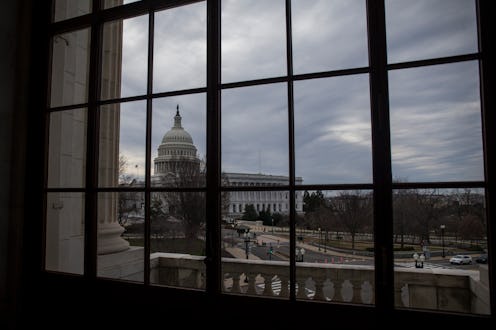News
How To Help Communities Affected By The Shutdown, Because There's No End In Sight

The partial government shutdown has dragged on for well over a week, and currently there is no end in sight. In the meantime, hundreds of thousands of federal workers, government contractors, and their families are enduring without paychecks — and that's causing serious problems in communities nationwide. If you're wondering how to get involved, there are a few tips on how to help communities affected by the government shutdown.
Congress will begin a new session on Thursday, and one of its most pressing priorities will be passing a funding bill to get the government back open. But with a newly Democratic House and a Republican Senate and White House, it's looking like an uphill climb to pass a bill everyone is happy with. Vox reported Wednesday that the House has two funding bills ready to go, one of which is a short-term spending bill to fund the Department of Homeland Security — but not the border wall Trump has been pushing for.
Sen. Majority Leader Mitch McConnell told NBC's Frank Thorpe that he would not bring either of the House bills to the floor since he does not think Trump would approve them without border wall funding. So even if they do pass the House, they could be pretty much dead after that. This impasse is creating a strain on the environment, health care access, home loan applications, and more. Until it's cleared up at the federal level, here are some ways you can help.
Collect Trash At A National Park
During this shutdown, many national parks are open, but unstaffed, which has led to reports of rampant littering across park grounds. Join up with some friends, or contact your local chapter of a national parks nonprofit like the Sierra Club or the National Parks Conservation Association to organize a trash pick-up day.
Give To A Rural Development Organization
The U.S. Department of Agriculture announced last week that it would not be able to grant any new rural development loans during the shutdown. These loans are specifically used to help fund housing, business, and utility development in rural areas. While the USDA is out of the picture, consider donating to nonprofits that work in rural development, like the Rural Development Initiative, which supports community development in the Northwest or NeighborWorks America, which promotes affordable rural housing across the country.
Show Love For Businesses Supporting Furloughed Workers
Activist and chef José Andrés is offering free lunches to federal workers at his restaurants while the partial shutdown continues. If you live around Washington D.C. you can help support the cause by patronizing one of those restaurants — Oyamel Cocina Mexicana, Zaytinya, America Eats Tavern, China Chilcano, Beefsteak, or Jaleo.
If you don't live in D.C. — or even if you do — consider petitioning businesses in your area to offer discounted services for local federal employees. Federal workers affected by the shutdown included Coast Guard members, TSA officers, air traffic controllers, and more. To find out what groups of federal workers live in your community, contact your House representative.
Donate To Native Health Organizations
Among those hamstrung by the shutdown are Native American communities. The Department of Interior is one of the agencies currently shut down, and its Bureau of Indian Affairs is responsible for providing basic services to about 1.9 million indigenous people across the country, according to The New York Times. Those services include providing health services and food supplies.
There are lots of nonprofits working to improve health care and other resources for Native Americans and Alaska Natives — all of them could benefit from donations. Check out the Center for American Indian Health, the Healthy Alaska Natives Foundation, and Partnership with Native Americans to get started.
Pressure Your Representative
Congress just began its new session on Thursday morning, swearing in dozens of new faces for office. Among their top priorities right now is passing a funding bill to reopen unfunded government agencies. While employees of the federal government usually get retroactively compensated for working during the shutdown, contractors like janitors and security guards don't, reports ABC News.
Even though the shutdown is largely a stalemate between House Democrats and President Trump, it's still important to make sure your representatives hear your voice on the matter. Advocate for federal workers in your community by reaching out to your House representative and senators to urge them to pass a bill that ensures backpay for both federal employees and contractors. Find out how to contact your legislators here.
A federal government shutdown is not limited to just Washington D.C. — there are federal employees in every state, including Justice Department employees, national park rangers, veterans affairs workers, and more. If you're looking to help out, volunteer your time and money to help those workers in your community get by until Congress passes a new funding bill.